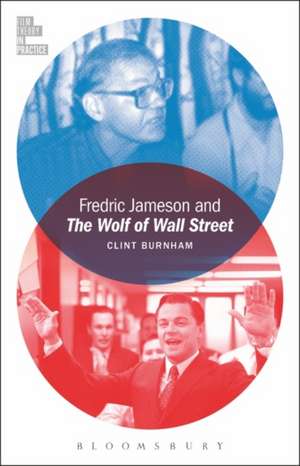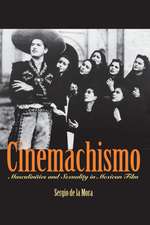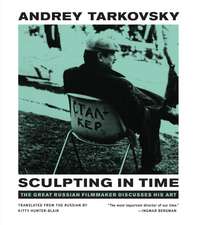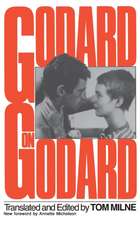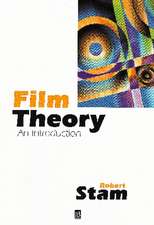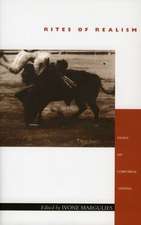Fredric Jameson and The Wolf of Wall Street: Film Theory in Practice
Autor Professor Clint Burnhamen Limba Engleză Paperback – 19 oct 2016
The Film Theory in Practice series fills a gaping hole in the world of film theory. By marrying the explanation of a film theory with the interpretation of a film, the volumes provide discrete examples of how film theory can serve as the basis for textual analysis. Fredric Jameson and The Wolf of Wall Street offers a concise introduction to Jameson in jargon-free language and shows how his Marxist theories can be deployed to interpret Martin Scorsese's critically acclaimed 2013 film The Wolf of Wall Street. Beginning with a detailed account of Jameson's extensive writings on Marxist theory and how they have been deployed in the analysis of film writings, Clint Burnham then illustrates how Jameson's theory can help to make sense of The Wolf of Wall Street, a film that shows in all its glory the excesses, lunacies, and inner workings of 1990s finance capitalism. As Jameson has influentially argued, films like The Wolf of Wall Street are both complicit in and critical of their historical subject: Scorsese's film is not about the richest stockbrokers, but the Long Island penny traders who made it big. As a narrative of American success, it is also a film about failure. Clint Burnham's reading of Jameson and The Wolf of Wall Street is a book about a contemporary film, and contemporary events, and contemporary theory.
| Toate formatele și edițiile | Preț | Express |
|---|---|---|
| Paperback (1) | 131.83 lei 22-36 zile | +48.77 lei 6-12 zile |
| Bloomsbury Publishing – 19 oct 2016 | 131.83 lei 22-36 zile | +48.77 lei 6-12 zile |
| Hardback (1) | 463.85 lei 43-57 zile | |
| Bloomsbury Publishing – 19 oct 2016 | 463.85 lei 43-57 zile |
Preț: 131.83 lei
Preț vechi: 171.89 lei
-23% Nou
25.22€ • 26.41$ • 20.87£
Carte disponibilă
Livrare economică 17-31 martie
Livrare express 01-07 martie pentru 58.76 lei
Specificații
ISBN-10: 1501308343
Pagini: 192
Dimensiuni: 127 x 197 x 19 mm
Greutate: 0.23 kg
Editura: Bloomsbury Publishing
Colecția Bloomsbury Academic
Seria Film Theory in Practice
Locul publicării:New York, United States
Caracteristici
Notă biografică
Clint Burnham teaches theory and popular culture at Simon Fraser University, Canada. His books include The Jamesonian Unconscious: The Aesthetics of Marxist Theory (1995), The Only Poetry that Matters: Reading the Kootenay School of Writing (2011), and the collections Digital Natives (2011, co-ed. with Lorna Brown) and From Text to Txting: New Media in the Classroom (2012, co-ed. with Paul Budra).
Cuprins
- Introduction- Section 1: Fredric Jameson and Film Theory - Section 2: Marxism and The Wolf of Wall Street- ConclusionAppendices:- Further Reading- Filmography (Applying the Jamesonian approach to other films)BibliographyIndex
Recenzii
Nothing fugazi here. Clint Burnham has assembled an engaging tour of the critical theories of Fredric Jameson, resulting in perhaps the best introduction to this major figure that has ever been written. He deftly demonstrates the analytical powers of Jameson's concepts by opening up the ideological complexities of Martin Scorsese's The Wolf of Wall Street. By the end of the book, we see this entertaining and maddening movie as a shimmering product of our stage of capitalism, and we grasp completely the profound importance of confronting the political unconscious of our most visible cultural works. Highly recommended for scholars and students of contemporary culture who seek to understand the ideological atmosphere of our time and Scorsese's version of the strange rituals of Wall Street exuberance.
Clint Burnham provides a patient and ambitious introduction to our greatest cultural thinker, Fredric Jameson, whose intellectual virtuosity has often eluded such clear engagement. This is an act of real generosity. At the same time, Burnham produces a bravura reading of Wolf of Wall Street and of Martin Scorsese, who may be the Jameson of US filmmaking. But the great achievement here is not simply to do these things together, but do them at once. It is a show-don't-tell triumph of dialectical thought that illuminates the real object of study here: not Jameson, not Scorsese, but the dialectic itself.
A commendably accessible and insightful introduction to Jameson's film theory and cultural critique, Burnham's book doubles as a witty and perceptive contribution to contemporary debates on the representability of class and financialized capitalism in a period of crisis.
